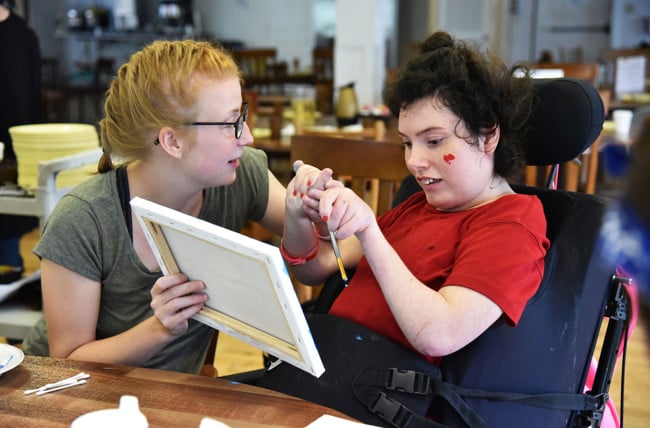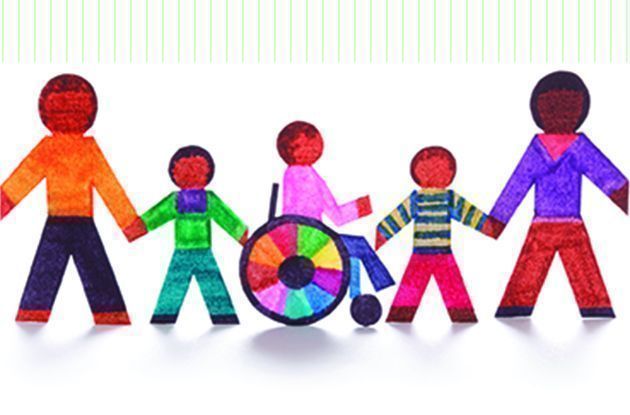
The Benefits of Summer Camp for Children with Special Needs
Though finding the best summer camp for your child with special needs may be a daunting task, the benefits of attending are numerous for your child—and you.
Get kid-friendly activities sent to you!
Get the Best Kid-Friendly Activities
Sent to You Weekly!
Can you describe your camp landscape and size?
Get a lay of the land. Some camps are large, and some are small (both in number of campers on the property as well as acres of land). This will impact everything from sensory needs to activity options. The volume of 250 campers in a dining hall is quite different than 60. Where will your child feel most comfortable? If it’s an overnight camp, understand the physical space of the cabin, bunk beds, number of bathrooms, where counselors sleep, and what overnight support looks like. Some camps have robust technology supports, such as PEC communication and sensory breakout rooms, and others may not have such equipment.
What is the staff-to-camper ratio and will this ratio comfortably meet the needs of my child? Who are your staff? How are your staff trained?
When caregivers are forthright about their camper’s anticipated needs while at camp, the camp program is better prepared to support them in their stay and set them up for success. Make sure to not only share what your child’s best day looks like, but also what a tough day looks like. Unfortunately, not every day is everyone’s best day.
Equally important is to understand the makeup of the staff team and their backgrounds. What are their ages, what is the support structure, do they have any clinical credentials (if that’s important to you)? Many camps for children with disabilities are strictly focused on recreation and a traditional camp experience, hiring enthusiastic and caring college students. Others look to meet camper needs by hiring experienced clinical staff such as social workers, physical therapists, and applied behavior analysis therapists.
What is in place for medical support?
There are logistics to consider around potential medical attention your child may need while at camp. Important things to explore may include how the camp supports dietary considerations, who is working the camp, and what training they receive in advance of your child arriving at camp. Will your child keep their inhaler with them, will a counselor have the inhaler, or will it be kept at the health center? If your child has a dietary restriction or significant allergy, ask about the camp’s policy around this food. Is this food on-site at all? If so, in what capacity? Understand the risk for cross contamination if food is prepared on-site. You’ll want to disclose if your camper has strong preferences around food, perhaps they don’t want different foods to touch on their plate, or they only eat peanut butter and it turns out to be a peanut-free camp. Can you send them with snacks they enjoy, which will be kept by management?
What will communication look like while my child is at camp? What type of updates will I receive (emails, phone calls, photos, letters from child) and how frequently?
Be upfront if the communication plan from camp does not meet your expectation or needs. Many camps operate with an understanding that “no news is good news.” Does this work for you? Consider the size of the program and how that scale may impact individualized communication at home.
How is success measured at camp and how can I set up my camper up to be successful?
Families sign their kids up for camp with different goals in mind. That may or may not be the objective of the camp. Do your goals align with the camp’s goals? What does a successful camp stay look like? Equally important to what success looks like at camp is understanding what happens when things do not go as planned. What events or circumstances may cause an early departure? What needs are unable to be met at this camp? Who is responsible for the transition to home if a child needs to end their stay early? While not always fun to talk about, trying something new has many unknowns. An unfamiliar setting with new people and first-time experiences can promote new responses from campers.
Ask the camp what you can do as a family to help for a smooth transition to camp. Consult with your camper’s teachers to potentially mirror what has worked at school. We suggest visiting camp and getting a tour, integrating camp into therapy discussions, talking to a current camp family, creating a social story, or looking at the camp video or pictures online—whatever feels most comfortable for you and your child.
The camp search is often daunting, but the long-term benefits for you and your child are substantial. Taking the time to research camp options will set both you and your camper up for success. While your camper is tie-dying a T-shirt for the first time, you may also find time for yourself. When vetting camps, take your time, take notes, and trust your gut. As your child grows and develops, you may end up exploring different camps down the road, and that is okay. You and your child will find the perfect match in no time. Camp is an unforgettable experience for everyone.
RELATED: Want more special needs news, tips, and resources? Read Special Parent.







